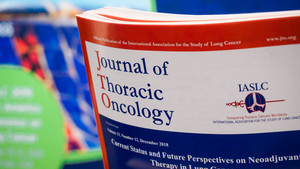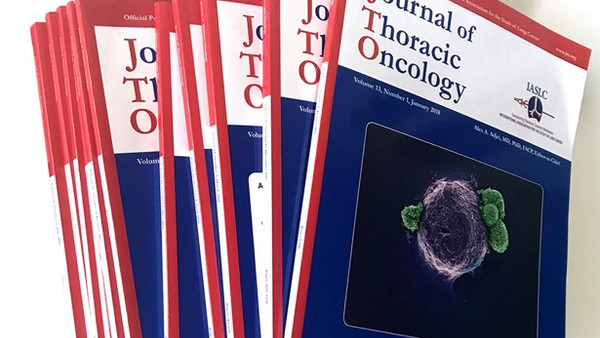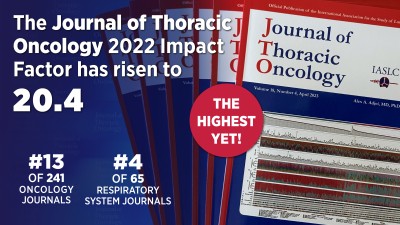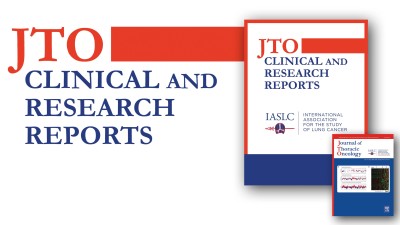Complimentary access to the JTO and a 15% discount on the publication fees for the newest open-access IASLC journal, JTO CRR. Both JTO and JTO CRR feature novel research about the prevention, detection, diagnosis, and treatment of all thoracic malignancies. JTO is among the top 5% of all oncology journals and the leading journal that is entirely focused on thoracic oncology.
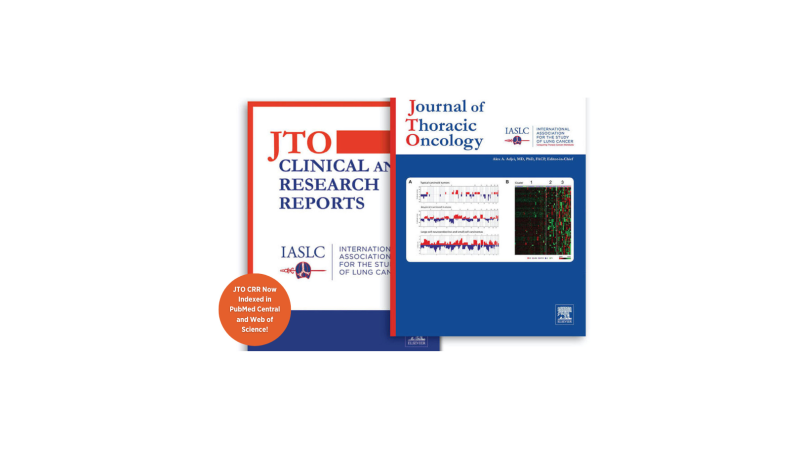
JTO and JTO CRR feature novel research about the prevention, detection, diagnosis, and treatment of all thoracic malignancies. With an Impact Factor of 20.8, JTO is among the top 3% of all oncology journals and the leading journal that is entirely focused on thoracic oncology. It emphasizes a multidisciplinary approach and includes original research, reviews, and opinion pieces. JTO CRR, IASLC’s open-access companion title, publishes a range of manuscripts, from subset analyses of published trials to high-quality case reports. JTO CRR has an Impact Factor of 3.5 and is indexed in PubMed and Web of Science.
JTO by the Numbers


EDITOR-IN-CHIEF, JTO ON 2024 IMPACT FACTOR
Alex A. Adjei, MD, PhD, FACP
"I would like to share the Journal of Thoracic Oncology's (JTO) progress with you. The Impact Factor is 20.8. This is a slight decrease from 21.1 last year. The journal remains a "high impact journal" with an IF > 20. The journal ranks third among 108 respiratory medicine journals and remains at 13th among 326 oncology journals. Because of the narrower focus, it is generally difficult for organ specific oncology journals to make a significant impact in the oncology publishing landscape. With an Impact Factor of 20.8, JTO is the leading journal in thoracic oncology and in the top thirteen of all three hundred and twenty-six cancer journals.
As the leading thoracic oncology journal, its strength is in its multidisciplinary approach to research. JTO continues to have a quick turn-around time of one week to initial decision, and an average of 2.8 weeks for revisions, a fast-track category, publish on acceptance, and promotion of select articles via social media and press releases. Authors can promote their own research by utilizing Elsevier enhancements such as Sharelink.
The continued prominence of JTO in the highly competitive general oncology journal landscape is due to the support of the IASLC office and IASLC members, as well as our dedicated publishing team and exceptional editorial board members."
JTO CRR By the Numbers


EDITOR-IN-CHIEF, JTO CRR ON 2024 IMPACT FACTOR
Emily Stone, MBBS, PhD, FRACP
"I am delighted to share with you that the impact factor for JTO Clinical and Research Reports (JTO CRR) is 3.5, an increase from last year's IF of 3.0. This puts the journal in the top half of oncology journals and in the top third of respiratory journals. This reflects the tremendous support from the IASLC, the journal team as a whole, the remarkable group of Associate Editors, our editorial office team, and all our reviewers.
As you know, an academic journal's impact factor reflects the frequency of citations for an average article in a particular year and is used as a marker for rank, importance, and prestige.
JTO CRR, the open-access sister journal to JTO, provides researchers with opportunities to publish a wide range of studies in thoracic oncology and is committed to the very highest quality research. We work hard on rapid turn-around with time to first decision of less than one week, prompt review, and publication on acceptance via the Article-Based Publishing workflow at Elsevier.
I would like to thank our submitting authors, reviewers, editorial board members, editorial and publication staff, and, of course, the IALSC for supporting this journal. JTO CRR looks set for an exciting future."
Most-Cited Journal of Thoracic Oncology Articles in 2024
The 2021 WHO Classification of Lung Tumors: Impact of advances since 2015
Diminished Efficacy of Programmed Death-(Ligand)1 Inhibition in STK11 and KEAP1-Mutant Lung Adenocarcinoma Is Affected by KRAS Mutation Status
Camrelizumab plus carboplatin and paclitaxel as first-line treatment for advanced squamous non-small-cell lung cancer (CameL-sq): a phase 3 trial
Treatment Characteristics and Real-World Progression-Free Survival in Patients with Unresectable Stage III NSCLC who Received Durvalumab After Chemoradiotherapy: Findings from the PACIFIC-R Study
IMpower150 Final Exploratory Analyses for Atezolizumab Plus Bevacizumab and Chemotherapy in Key NSCLC Patient Subgroups With EGFR Mutations or Metastases in the Liver or Brain
Small Cell Lung Cancer: Epidemiology, Risk Factors, Genetic Susceptibility, Molecular Pathology, Screening and Early Detection
Predictive Biomarkers for Immunotherapy in Lung Cancer: Perspective from the IASLC Pathology Committee
The 2021 World Health Organization Classification of Tumors of the Thymus and Mediastinum: What’s new in thymic epithelial, germ cell and mesenchymal tumors?
Recent journal articles
"Brief Report— “Brain Metastases in Diffuse Pleural Mesothelioma: Clinical, Histologic, and Molecular Correlates”
Upregulation of E-cadherin Promotes Spheroid Formation in Crizotinib-Resistant H2228 Lung Cancer Cells with EML4-ALK Translocation
Long-term response and survival in extensive stage small cell lung cancer receiving atezolizumab plus chemotherapy in a real-world setting: IFCT-1905 CLINATEZO
Patient-Reported Outcomes with Consolidation Durvalumab Versus Placebo Following Concurrent Chemoradiotherapy in Limited-Stage Small-Cell Lung Cancer: Results from the Phase 3 ADRIATIC Trial
Impact of KRAS Mutations and Co-Alterations on Outcomes in Stage III Non-Squamous Non-Small Cell Lung Cancer Treated with Chemoradiation and Immunotherapy
Safety and Antitumor Activity of Farletuzumab Ecteribulin in Patients With Non-Small Cell Lung Cancer: Phase I Expansion Results
Mutation-Specific Response to Ramucirumab in EGFR-Mutated Metastatic NSCLC: Insights From Circulating Cell-Free DNA Profiling (Liquid Biopsy Japan Addendum of RELAY Phase 3 Randomized Study)
Treatment patterns, outcome and QoL of ES-SCLC patients receiving third-line therapy – Data from the German CRISP Registry (AIO-TRK-0315): A Brief Report
Discover the JTO
More than 80 international experts compose the JTO Editorial Board, allowing for a quick turn-around time of 1 week to initial decision, and an average of 1.6 weeks for revisions, a fast track category, publish on acceptance (within 5 days), and promotion of select articles via social media and press releases.
JTO emphasizes a multidisciplinary approach and includes original research (clinical trials and translational or basic research), reviews, and opinion pieces. Authors can take advantage of Elsevier's Researcher Academy, Navigate your research journey with Researcher Academy—free e-learning modules on navigating your career developed by global experts.
JTO reviewers are given the privilege of getting the first look at novel research, phase III data, and potentially practice-changing concepts. Email your CV to JTO@iaslc.org.
New JTO Collections
Discover the JTO CRR
In addition to the content discussed previously, JTO CRR also accepts region-specific clinical trials, subspecialty thoracic oncology studies, and select high-quality meeting reports.
To become a JTO CRR Reviewer email your CV to JTOCRR@iaslc.org.





